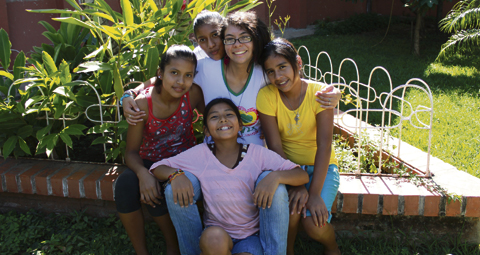BY Martin Dunlop | September 21 | ![]() 0 COMMENTS
0 COMMENTS ![]() print
print

Life-changing mission for young Scot
Martin Dunlop catches up with an East Kilbride parishioner returning from a year in the missions
A Catholic student from East Kilbride has spoken about the unforgettable—but, at times, harrowing—experience of spending the past year working with the poorest communities and orphaned children in South America.
This time last year, Amadita Garcia, a parishioner of St Leonard’s Church in East Kilbride, was preparing to set off for Bolivia, where she went on to spend six months assisting at the Hogar Sagrado Corazón (Sacred Heart Home) near Santa Cruz.
This is where 150 girls—who have been abandoned, orphaned or in some way abused—call home and are cared for by two nuns and a small group of volunteer helpers.
Work in progress
As Amadita explained, although the orphanage gives the girls a safe environment, food and education, they are lacking in so many other areas of their lives.
“Every single girl has a heartbreaking story,” Amadita said. “The place is built on suffering.
“All the girls have problems, some have lost their parents, some of their mothers and fathers have beaten them or are drug addicts, or they have been living on the streets. They have psychological issues but there is nobody to help them with this. All they really want is to have a mother figure in their lives.”
Amadita recalled one girl in particular, 12-year-old Lizeth, as having a particularly harrowing story.
“Lizeth’s mum had also been in the orphanage when she was younger,” Amadita said. “She then got married, but her husband beat her and left her with her children. She later contracted cancer and died when Lizeth was just 10 years old.”
She explained that Lizeth was then left to look after her little sister, brother and a young baby but would still find time to visit her mother when she was in hospital before her death.
“It has been incredible what she has been through,” Amadita said. “All she wanted when I was at the orphanage was a mother and somebody to look after her.”
Scottish support
Throughout her time in Bolivia, Amadita was glad to be able to pass on considerable donations from Scottish schools and churches, all from people keen to help in the development of the Sacred Heart orphanage.
St Andrew’s and St Bride’s High School, St Leonard’s, St Kenneth’s and St Hilary’s primary schools, all in East Kilbride, sent large sums of money to help the Bolivian orphans, in addition to the great support received from Amadita’s own parish of St Leonard’s.
“I had such amazing support from the parish,” she said. “I didn’t expect that people would take so much interest. I sent photos to my mum, who printed them off and made a display for the parish to see where their money was going and what I was doing.
“I got so many emails from people in the parish and teachers in the schools. People were giving my mum donations all the time, even people that I have never spoken to before, they were all giving donations to the orphanage; it was incredible.
“I don’t know if people realise how much their help means to the community out in Bolivia.”
Amadita went on to explain that one donation in particular—a sum of more than €1000 from an uncle in Germany—was able to save the life of a baby boy who was brought to the orphanage having been found abandoned on the street.
“He was only a couple of weeks old and his name was Mateo,” she said.
“He was so ill that he was on the verge of death. If he had been left on the street any longer he would have died. I found it so sad that some of the children we were looking after would have been brought to the orphanage in a similar situation.
The madre [mother] of the orphanage didn’t have any money to pay for his medicine.”
On hearing this news, Amadita’s uncle decided to do his own bit to help by organising a fundraising concert. A cheque was subsequently sent to the Bolivian home from Germany, and was used to pay for medicine for Mateo.
“This donation saved his life,” Amadita said. “It was amazing.”
Legacy
Amadita explained that the community is in need of ongoing support to bolster the little funding the sisters receive from the Bolivian authorities.
“As soon as they get any money they have to spend it, especially on maintenance for the building as it is very old,” she said. “They only have four toilets for 150 girls. The building needs new roofing and the walls are all crumbling.
“The girls do their best though and clean the building every day. It is incredible how hard they work.”
She added that, despite many of the girls facing an uncertain future, all orphans at the Hogar Sagrado Corazón have an overseas sponsor, each contributing around $40 a year. Part of that donation pays for each girl to get a birthday present each year, while the rest of the money is put into a savings account giving the girls the opportunity to go to university after they have finished school.
As Amadita discovered, the care and attention the orphans receive from the sisters and volunteers can have a positive and long-lasting impression on many of the girls, some of whom choose to remain within the community in adult life.
“When I was there, there were four or five older girls, who had been in the orphanage since they were babies and had grown up there,” she said. “They are at university studying law but they have chosen to stay on in the orphanage and look after the younger girls as they know what their lives are like.
“They have wanted to stay as they see it as their home.”
Ecuador
Following her time in Bolivia, Amadita spent time in Ecuador, firstly, working with her cousin, a missionary nurse, who lives in a jungle community near Santa Maria, and, secondly, in the shanty town of Nueva Prosperina in the city of Guayaquil.
It was in Nueva Prosperina that Scottish priest Fr Martin Chambers recently spent five years, and the community has maintained strong links with Scotland.
Although experiencing similar levels of poverty to what she witnessed in Bolivia, Amadita spoke about the role of the family within the Nueva Prosperina community, and how, even when faced with some of the most challenging of circumstances, the people ‘still manage to stay happy.’
This spirit and the determination to make the most of life is something that Amadita saw in abundance when working at the local school.
“Just to get through a basic education—with all the problems these people are subjected too, such as gangs, drugs, knife-crime and living in poverty in a shanty town—is a miracle in itself,” she said. “It shows how strong these people are.”
The ‘extreme’ financial poverty suffered by those living in the jungle community near Santa Maria is also in contrast to the richness of the love and care they have for the family.
“The most simple thing for these people is so difficult,” Amadita said. “I remember a lady there, Anna, who has six children, all of whom are blind and her youngest child has cerebral palsy. Anna has no wheelchair, and to get medication for her youngest child she has to carry her down a steep hill to get to a canoe. She would then take her on a two-hour canoe ride, followed by a four-hour bus ride, carrying her daughter throughout, just to get to the nearest hospital.”
On returning to Scotland, Amadita has begun a course studying law at Glasgow University. She hopes, however, that she will be able to continue supporting the communities that have shown her such love and care over the past year and, perhaps, have the opportunity to return and help them again in person.











